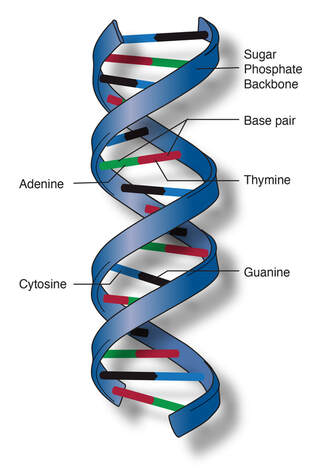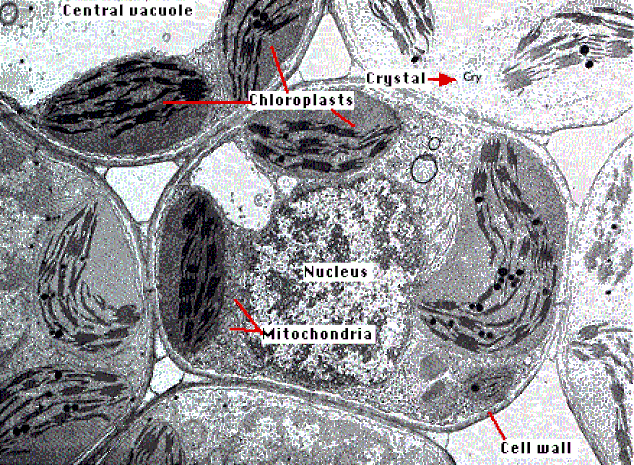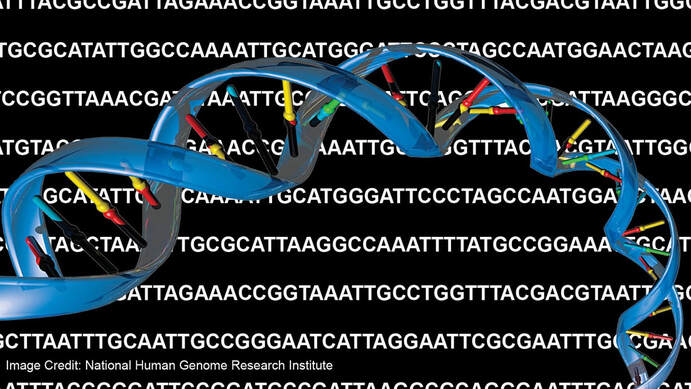|
John writes … As we have written in the book, one of the essential requirements for life is an information-carrying molecule that can be replicated/self-replicated. That molecule is DNA, the properties and structure of which fit it absolutely beautifully for its job. That DNA is the ‘genetic material’ seems to be embedded in our ‘folk knowledge’ but it may surprise some to know that the unequivocal demonstration of DNA’s role was only achieved in the mid-1940s. This was followed nine years later by the elucidation of its structure (the double helix), leading to an explosion of research on the way that DNA actually works, how it is regulated and how it is organised in the cell.  Schematic of the double helix. Credit: National Human Genome Research Institute. Schematic of the double helix. Credit: National Human Genome Research Institute. It is latter feature on which I want to briefly comment. In all eukaryotic organisms (organisms with complex cells, which effectively means everything except bacteria) DNA is arranged as linear threads organised in structures called chromosomes which are located in the cell’s nucleus. Further, as was shown when I was a student, the sub-cellular compartments known as mitochondria (which carry out ‘energy metabolism’) and in plant cells, chloroplasts (which carry out photosynthesis) contain their own DNA (as befits their evolutionary origin – see the book (1)). However, there has been debate for many years as to whether there are any other types of DNA in animal or plant cells. Indeed, I can remember discussing, many years ago, a research project which it was hoped would answer this question. Obviously if a cell is invaded by a virus, then there will be, at least temporarily, some viral genetic material in the cell but as for the question of other forms of DNA, there has been no clear answer.  Labelled electron micrograph of a plant cell showing nucleus, mitochondria and chloroplasts. Credit: H. J. Arnott and Kenneth M. Smith. Labelled electron micrograph of a plant cell showing nucleus, mitochondria and chloroplasts. Credit: H. J. Arnott and Kenneth M. Smith. Which brings me to a recent article in The Guardian newspaper (2). Scientists have known for some time that some cancers are caused by specific genes called oncogenes (3). It has now been shown that some oncogenes can exist, at least temporarily, independent of the DNA strands that make up our chromosomes. In this form, they act like 'Bond villains' (4) according to some of the scientists who work on this subject, leading to formation of cancers that are resistant to anti-cancer drugs. In order to prevent such cancers we now need to find out how these oncogenes or copies thereof can 'escape' from chromosomes to exist as extra-chromosomal DNA. I would also suggest that they may be deactivated by targeted gene editing. John Bryant Topsham, Devon February 2023 (1) Graham Swinerd and John Bryant, From the Big Bang to Biology: where is God?, Kindle Direct Publishing, 2020, Chapter 5 (2) ‘Bond villain’ DNA could transform cancer treatment, scientists say. Cancer Research, The Guardian newspaper. (3) Oncogenes are mutated versions of genes that normally have a regulatory role in cell proliferation. When mutated they promote unregulated cell proliferation. They occur in all vertebrate animals and homologous sequences have been found in fruit flies. (4) The villains in James Bond films are often both sinister and subtle.
0 Comments
|
AuthorsJohn Bryant and Graham Swinerd comment on biology, physics and faith. Archives
July 2024
Categories |


 RSS Feed
RSS Feed
